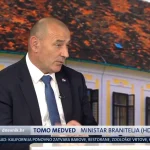Oct. 10, 2018 — A trip to a psychiatric hospital coincides with human rights organizations decrying Croatia’s habit of cordoning off the mentally ill.
The man waved at my grandfather and I from 200 meters away, then began a gentle jog and shouted, “Oh hello my old friend! It’s so good to see you again, now taking care of your old man!”
“Who is he?” my grandfather asked. He turned around in his wheelchair to face me. “Do you know him?”
“No, but apparently he knows us,” I replied as I pushed his frail 90-year-old frame along.
“My old friend, it’s so good to see you again,” the stranger shouted again as he closed in on us.
My grandfather looked around him then shifted to face me again, his eyebrows converging in the middle of his forehead.
“Where are we?”
“In a nice park!” I replied as we passed by a thick layer of cigarette butts under a bench.
I didn’t have the heart to tell my granfather the truth: that we were in the middle of a psychiatric hospital on the island of Ugljan, a place the locals call the ludara (nuthouse). I didn’t want to say a bizarre, family-wide spell of Murphy’s Law meant he had to spend some time here, instead of at home.
This psychiatric hospital also happens to also have a specialized facility for the elderly dementia and Alzheimer’s patients, suited to Dido’s state of perpetual confusion. But he didn’t need to know that.
Most of all, I didn’t want to say the smiling man approaching us, in his slippers, bathrobe and tell-tale hospital issued green pants, was one of the ludara’s patients.
My visit Wednesday morning coincided with five human rights organizations once again decrying the Croatian government’s inability to make psychiatric institutions a thing of the past.
Over 7,800 Croatian adults and children with disabilities live in state-run institutions, based on the government’s own 2017 figures. Another 2,000 live in privately-operated, publicly-funded facilities. These figures don’t include people assigned long-term care in psychiatric hospitals without their consent.
“The Croatian government needs to move more quickly to meet its obligations under the international disability rights treaty, which it ratified a decade ago,” said Human Rights House Zagreb’s Ivan Novosel. “This includes removing all legal and societal barriers that prevent people with disabilities from taking an active and full part in society.”
It’s the second time this year Croatia has been singled out for its anachronistic policy of walling-off the intellectually and psychosocially disabled, relegating them to facilities well away from the general population, while often also stripping them of their legal autonomy.
“We documented that the process of moving people out of institutions and into the community has stalled and that no progress has been made on restoring legal capacity,” read an open letter addressed to Prime Minister Andrej Plenković and signed by five organizations — Inclusion Europe, European Network on Independent Living, Kuca za ljudska prava (Human Rights House), Centar za mirovne studije (Center for Peace Studies) and Human Rights Watch.
The practice deviates from the UN Convention on the Rights of Persons with Disabilities, which Croatia ratified a decade ago to eliminated scenes like my mid-morning stroll with Dido.
The stranger caught up to us, mouth locked in a wide smile. “How are you? How is your Dido?!” he shouted, arms locked in a wide welcome.
“We’re about as good as we can be,” my grandfather said politely. “How about you?”
“Oh, you’re so lucky to have someone young to look after you!”
My grandfather’s nonchalance towards the patient made my own searing urge to pull my limbs into my torso like a scared turtle feel shameful.
In the abstract, releasing people from institutions and into the broader public can seem daft. The myriad stereotypes and pop-culture images of a madman roaming the streets flood the mind.
Yet there’s a simpler reality: most of these people can find their way in the world. They just need a little help.
The Ministry of Demographics, Family, Youth and Social Policy in April told Human Rights Watch it would increase its efforts to transition the disabled to community-based living, only to back out a month later.
The Croatian government has instead drafted a law which would shift people out of institutions and into foster homes — no consent required.
This does little to satisfy either the human rights groups, the United Nations Committee on the Rights of People with Disabilities or Croatia’s Ombudswoman for Persons With Disabilities. All have criticized the practice of placing disabled adults and children in foster care.
Yet one could argue foster care trumps the current facilities.
The hospital my grandfather resides in has all the standard conveniences one would expect from a place stuck in the “One Flew Over The Cuckoo’s Nest” era of psychiatric care.
Patients clothed in easy-to-spot uniforms; bars on windows; locked entrances to most buildings; a quite shuffling of feet in hallways. The few patients lucky enough to see sunlight spend their days chain smoking under bucolic pine trees.
Some even work up the gumption to approach a man pushing his grandfather in a wheelchair, place a hand on his shoulder and proclaim, “The lord appreciates the things you are doing. Good people make him happy.”
“Yes, he’s a good one,” my grandfather said.
I stared down at the floor and muttered a thank you then began shuffling off. Yet the hand remained on my shoulder, and suddenly the stranger’s lips were next to my ear.
“Listen friend, just one kuna. Please, any change in your pockets is fine,” he whispered. I nudged my grandfather then spun his wheelchair around.
“Hey Dido, this man wants some money. Should I give him some?”
My old looked the stranger up and down, squaring him up while also confused about the man’s proximity to my head. Finally, he snorted.
“No, I’ve seen hungry people before. He’s not hungry.”
It was a dirty ploy, engineered by me to alleviate an uncomfortable situation. My face grew flush with anger at my own cowardice.
The stranger pulled back and said, “Well, God bless you both!”
“Thanks. What’s your name?” I asked, the tension in my shoulders evaporating.
“May you live forever,” he replied.
“Let’s not get too optimistic,” I said, turning towards the ward Dido now calls home. “God doesn’t do those kinds of favors anymore.”
“But I am God,” he retorted. “I can give eternal life.”
Dido squirmed around in his wheelchair to face me, and smiled.
“That man needs help.”









